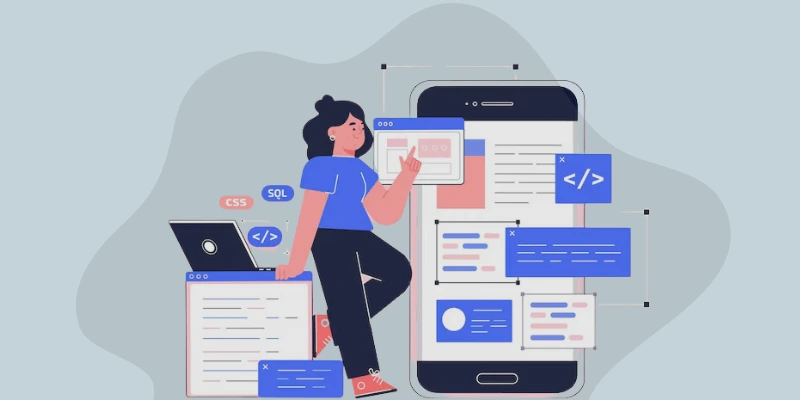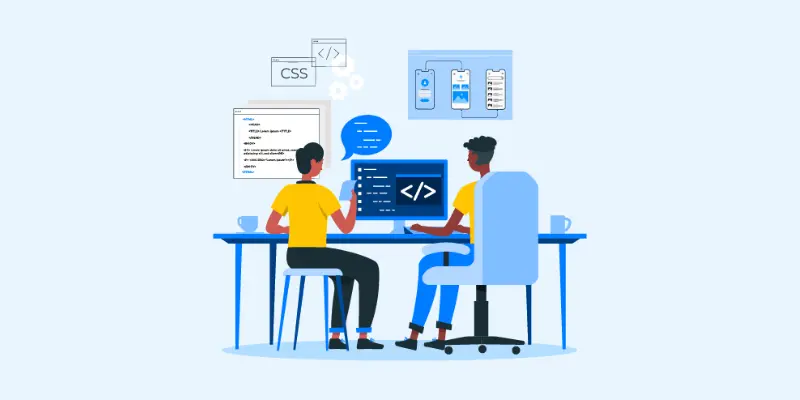Companies looking to build solid apps at competitive costs must hire dedicated mobile app developers as a necessary part of the development process. Costs associated with hiring app developers vary significantly and depend on many vital variables.
First and foremost, the geographical location of a mobile app developer is of prime importance. Developers who work in areas with more expensive living expenses - such as North America or Western Europe usually earn more hours of pay than those working in Eastern Europe, Asia, or Latin America; such factors directly affect budgetary issues.
Second, developer knowledge and experience play an instrumental part in cost. Experienced mobile app developers who deliver applications successfully will usually demand higher salaries than junior developers or those needing more specific expertise.
The scope and complexity of an app's project also impact its cost; apps requiring advanced capabilities like instant updates, integration with sophisticated systems, or complex user interfaces require more skilled professionals, longer development times, and higher creation costs.
Development agencies and freelance developers each present differing cost structures. While freelance developers may offer reasonable rates, established companies typically provide more significant support and flexibility and often carry higher prices but offer superior knowledge for managing projects.
Also Read: Top Qualities to Look for When Hiring a Dedicated Mobile App Developer
Steps to employ a Mobile App developer
We've put together a thorough guide about finding an app developer for mobile, starting from defining the requirements and evaluating applicants before completing the selection procedure.
Define Your Project Requirements
Before beginning the hiring process, it is crucial to understand the project's needs. It involves:
-
Determining the scope: Determine the functionalities and features that your application requires. Consider compatibility with platforms (iOS, Android, or both), preferences in the stack of technologies, and any particular integrations needed.
-
Timeline and Budget: Create realistic timelines for the development and launch phases. Set budgetary constraints and prepare for possible changes based on developer rates and the complexity of your project.
-
Skill and Knowledge: Identify the specific abilities and knowledge the project requires. This could include knowledge of particular software languages (e.g., Swift, Kotlin, Java), knowledge of Frameworks (e.g., React Native or Flutter), and proficiency in the development of backend API integrations.
Choose Your Hiring Model
Select the hiring strategy most suitable for your particular project and your organizational requirements:
-
Freelancers: Ideal for temporary projects or tasks. Flexible, but without the commitment of a long-term partner.
-
In-house developers: Permanent employees who work directly in your organization. Control and integration, however, demand higher expenses and commitment.
-
Outsourcing or Offshore Development: Involves a team of developers or an agency far away from your geographic area. It can save you money and give you access to expert knowledge; however, it requires effective communication and management.
Search for Candidates
When you've outlined your requirements for the project and you've chosen an employment model, It's now time to begin with the process of searching:
-
Job boards and platforms: Use platforms like LinkedIn, Indeed, Upwork, and GitHub to post job opportunities or find developers with appropriate skills.
-
Networking: Utilize professional networking and industry-related events and communities for developers to discover suggestions or referrals.
-
Tech Community: Engage with online forums, Stack Overflow, and GitHub repositories to find people who are active contributors and have know-how in the technologies you require.
Evaluate Candidates
Evaluation and screening the candidates' profiles is vital to ensure they're in sync with the expectations for the project and your company's culture:
-
Examine Portfolios and Projects: Assess previous work, apps created, and the GitHub repository to assess the level of technical expertise and high-quality work.
-
Assessment of Technical Skills: Test your coding skills through technical interviews or group programming sessions to evaluate problem-solving and coding skills.
-
Soft Communication and Skills: Examine interpersonal skills, teamwork, and communication skills since effective teamwork is crucial to successful project implementation.
Conduct Interviews
When you've selected individuals, you can conduct extensive interviews to assess the quality of their work:
-
Technical interview: In-depth understanding of the technical aspects and abilities to solve problems in mobile app development.
-
Conducting a Behavioral Interview: Examine the past, challenges, and examples of teamwork to determine your cultural compatibility and work ethic.
-
Specific Project Questions: Discuss their approach to project needs or problems to determine their knowledge and solutions.
Check References and Reputation
Before making a decision, verify your background and reputation.
-
Sources of Reference: Contact former employers or clients for comments on their service, reliability, professionalism, and dependability.
-
Web Presence: Check the details of their LinkedIn profiles, GitHub contributions, or online reviews to validate their knowledge and credibility in the community of developers.
Negotiate Terms and Finalize Contract
You can negotiate terms and conclude the hiring process when you've found the perfect person or team.
-
Contract agreement: The Contract should clearly define the scope, deliverables, timeframes, payment terms, and intellectual property rights in a formal contract.
-
Onboarding Process: Help facilitates a seamless onboarding procedure. This includes access to tools and documents, as well as team introductions.
Manage and Support Development
Throughout the process of development, ensure that you communicate clearly and provide help for the developer or team members:
-
Regular updates: Regularly schedule progress reports, demonstrations, and feedback sessions to keep track of the development progress and resolve any problems promptly.
-
Resources and Support: Provide necessary resources, technical assistance, and direction to ensure that developers have everything they require to be successful.
Monitor Performance and Provide Feedback
Assess the developer's performance and provide constructive Feedback to improve productivity and ensure alignment with the project:
-
Performance Metrics: Set up the most important performance indicators (KPIs), including high-quality code, conformance to timelines, and client satisfaction, to assess developers' performance.
-
Continuous Enhancement: Encourage constant learning and professional growth through education opportunities and feedback loops.
Maintain Long-Term Relationships
Establishing a long-term partnership with the mobile app developer could result in continuous service, updates, and enhancements in the future:
-
Feedback and Recognize: Recognize and acknowledge the contributions of others, offer constructive Feedback, and accept the accomplishments of others to promote an environment of mutual respect.
-
Future collaborations: Consider future projects, extensions, updates, or other new development projects by the same developers or team.
Read About: How to Hire Mobile app Developers for Your Custom Project in 2024?
What does it cost to engage a mobile application developer?
The price of employing a mobile app developer is contingent on the location of the developer and their previous experience, the difficulty of the task, and your preferences regarding the app's operating system (iOS, Android, or both). On average, costs can vary between $30 and $150 per hour worldwide.
In North America and Western Europe, the rates are typically more expensive, typically between $100 and $150 an hour for developers with experience. However, Eastern Europe and parts of Asia have somewhat lower rates, with an average of between $30 and $80 per hour.
About Read: Key Factors To Consider As You Hire Mobile App Developers 2024
Factors that affect the cost of hiring an App Developer. Mobile App Developers

The most important factors affecting how much it costs to hire a mobile app developer are:
Developer Experience and Expertise
The developer's expertise and experience can significantly impact the price. Developers with a longer period of experience and a track record of success in app deployments generally have higher prices. Their ability to tackle difficult issues, develop robust structures, and follow standard practices usually justifies their higher costs.
Location of the Developer
The geographical location is a major element in determining the developer's costs. Developers located in areas with an increased cost of living, such as North America, Western Europe, or Australia, typically charge higher than developers based in Eastern Europe, Asia, or South America. Offshore developers may offer price reductions but may need an attentive management system to ensure high-quality and efficient communication.
App Complexity and Features
The complexity of a mobile application directly relates to the development cost. Simple apps that provide basic functionality, such as information display or basic form input, can be less expensive to develop than complex applications that require integration with a variety of systems, advanced features like real-time updates or complex algorithms, or top-quality animations and graphics.
Platform (iOS, Android, Cross-Platform)
It is essential to consider the platform you choose. The development environment, tools, and even languages can affect costs. Development for iOS tends to be a bit more expensive because of the requirement for Mac hardware and the stricter App Store rules.
Android development involves dealing with fragmentation between platforms and OS versions, which can impact testing and possibly raise expenses. Frameworks that support cross-platform development, for example React Native or Flutter, will help cut expenses by allowing code from different platforms to reuse.
Development Timeline
The urgency of a project can increase costs since developers have to add resources or work extra hours to meet strict deadlines. A rushed development process can affect work quality, so ensuring speed is balanced with quality is essential. A longer development timeline spreads the cost over a longer period and could reduce upfront costs while also extending the time to market.
Developer Team Size and Composition
The size and makeup of the team can determine the costs. Teams with larger numbers or that require specific skills (e.g., UX/UI design, backend development, and testing for QA) will be more expensive. Smaller teams or developers on their own could provide cost savings; however, they may not have the depth of knowledge and speed at which they deliver in comparison to the larger team.
Communication and Project Management
Communication and management of projects is essential for the successful development of an app. Language barriers, miscommunication about requirements, or insufficient project management can raise costs and cause delays or scope creep. A clear communication channel and solid project management tools can reduce these dangers.
Additional Services and Support
Post-launch support services such as updates, maintenance of the app, bug fixes, maintenance, and support for ongoing use contribute to the total cost of ownership. Developers can offer different pricing options in these areas, including retainer agreements, hourly rates, or fixed-price plans. Making these clear upfront can help manage the long-term costs.
Reputation and Portfolio of the Developer
Developers with a solid reputation and a long-running portfolio of successful projects typically command higher rates. Their knowledge, experience, and ability to produce high-quality apps minimize the chance of delay or failure, possibly compensating for higher initial costs through long-term advantages.
Intellectual Property and Ownership
Understanding intellectual property rights and ownership of the application and the codebase is vital. Developers might charge differently depending on whether they own rights to reuse components or if the client has full ownership. Legal issues regarding royalties and licensing can affect costs, particularly for applications with proprietary algorithms or distinctive functions.
Must Read: Key Factors To Consider As You Hire Mobile App Developers 2024
Factors to Take into Account Before hiring a mobile application developer
Here are some important considerations to hire mobile app developers:
Define Your Requirements Clearly
Before you begin to look for an application developer, you should understand the requirements of your project. List the features and functions of the operating systems (iOS, Android, or both), as well as any other specific preferences for the design you have. This clarity will assist potential developers in better understanding the scope of your project and help them prepare precise proposals.
Evaluate Their Expertise and Experience
Find developers with relevant experience and a demonstrated track record of developing mobile apps. Check their past projects to determine how well they've done. Also, consider whether they've created apps that are similar to yours. Review and read testimonials from clients to determine their reputation and credibility.
Technical Proficiency
Check that your developers are skilled in the required frameworks and programming languages for developing mobile apps (e.g., Swift or Objective-C for iOS, Java or Kotlin for Android). They must also know about the principles of app design, the user's experience (UX) top practices, and the integration of APIs provided by third parties.
Communication and Collaboration
Communication is vital during the development of apps. Select developers who are responsive, active, proactive, and adept at clearly articulating their ideas. They must also be able to work closely with you to achieve your goals and incorporate Feedback incrementally.
Understand Development Methodologies
Please find out about the development methods developers employ (e.g., Agile, Scrum) and how they manage their project timeframes, milestones, and deliverables. Transparency in project management practices assures you that you're up-to-date about progress and can resolve any issues swiftly.
Consider Long-term Support and Maintenance
Making a mobile app is only the beginning. It needs regular support, updates, and ongoing maintenance. Discuss options for post-launch support with developers you are considering, such as improvements to features, bug fixes, and compatibility updates for updated OS versions.
Cost and Budget Considerations
Although cost shouldn't be the only factor to consider, it is important to create an appropriate budget and know how developers define their pricing (fixed-price as opposed to per-hour rates). Make sure that the price is in line with the work scope and the quality of the service.
Legal and Security Aspects
Ensure you protect your intellectual property rights by signing a comprehensive agreement outlining ownership, confidentiality clauses, and dispute resolution methods. In addition, consider a priority for those who follow security standards to secure the user's data and avoid weaknesses.
The compatibility with your Business Culture
Choose developers whose values and work culture align with your own. A culturally compatible team will lead to more collaboration and understanding, which ultimately leads to a better project result.
Seek Recommendations and Conduct Interviews
Do not hesitate to seek recommendations from your colleagues or colleagues who have completed similar projects. Interview developers who have been selected to determine their enthusiasm for the project as well as their ability to produce results within your timeframe.
Conclusion
Understanding the factors that affect what it will cost to employ a mobile application developer is vital for any company launching app development projects. To hire mobile app developer requires navigating a variety of factors that could have a significant impact on budgets and timelines for projects. First, the developer's expertise and skills are crucial.
Experienced developers with a long track record can command higher prices due to their experience managing complex projects and guaranteeing high-quality results. On the other hand, less experienced developers or those with less experience could offer better value solutions. However, they may require more supervision and education.
The second factor is that the decision between local hiring and outsourcing globally can significantly impact costs. Local developers usually have higher hourly costs. However, they offer advantages, such as ease of communication, alignment with the culture, and possibly quicker turnaround times.
Outsourcing to countries that have low labor costs may be more affordable, but it does require careful evaluation of the language barrier, time zone variations, and possible cultural differences.
Furthermore, the scope and complexity of the app's features affect cost estimates. Applications requiring sophisticated capabilities, integration with complex systems, or a high degree of customization usually require more development costs.
In addition, the selection of the development technology (iOS, Android, or cross-platform) and the requirement to maintain and update the app regularly are essential elements that should not be neglected when planning the Budget for development projects.
FAQs
1. What are the significant elements that affect the price of employing a mobile app developer?
The cost of employing a mobile app developer depends on various factors, including the location and expertise level, the amount of work required to design the app, and the platform(s) (iOS, Android, or both) targeted for development, as well as the requirements for features and functions.
2. What is the impact of the developer's location on the hiring costs?
The place of development is a major factor in determining cost. Developers located in areas with greater living standards and salaries, such as North America and Western Europe, usually have higher costs than developers based in Eastern Europe, Asia, or Latin America, where costs could be lower.
3. What part does the level of experience play in determining developers' pricing?
The developer's level of experience has a significant impact on the cost. Experienced senior developers with extensive expertise in mobile app development, particularly in niche sectors like augmented realities or fintech, typically have more than mid-level or junior developers who may be economical but with less experience.
4. What is the impact of the application's complexity on the costs of hiring?
The level of complexity in the mobile application directly affects the development cost. Basic apps with basic functions are less expensive to create than complex apps that need complex features, custom designs, integration with other systems, high levels of security, and scalability.
5. What are the other elements that can impact the total cost?
Other elements that affect costs are the timeline of the project and its urgency, the credibility of the developer's portfolio, the ongoing maintenance and support, and the necessity to add additional services like UI/UX design, quality assurance testing, and post-launch updates.













Share this blog